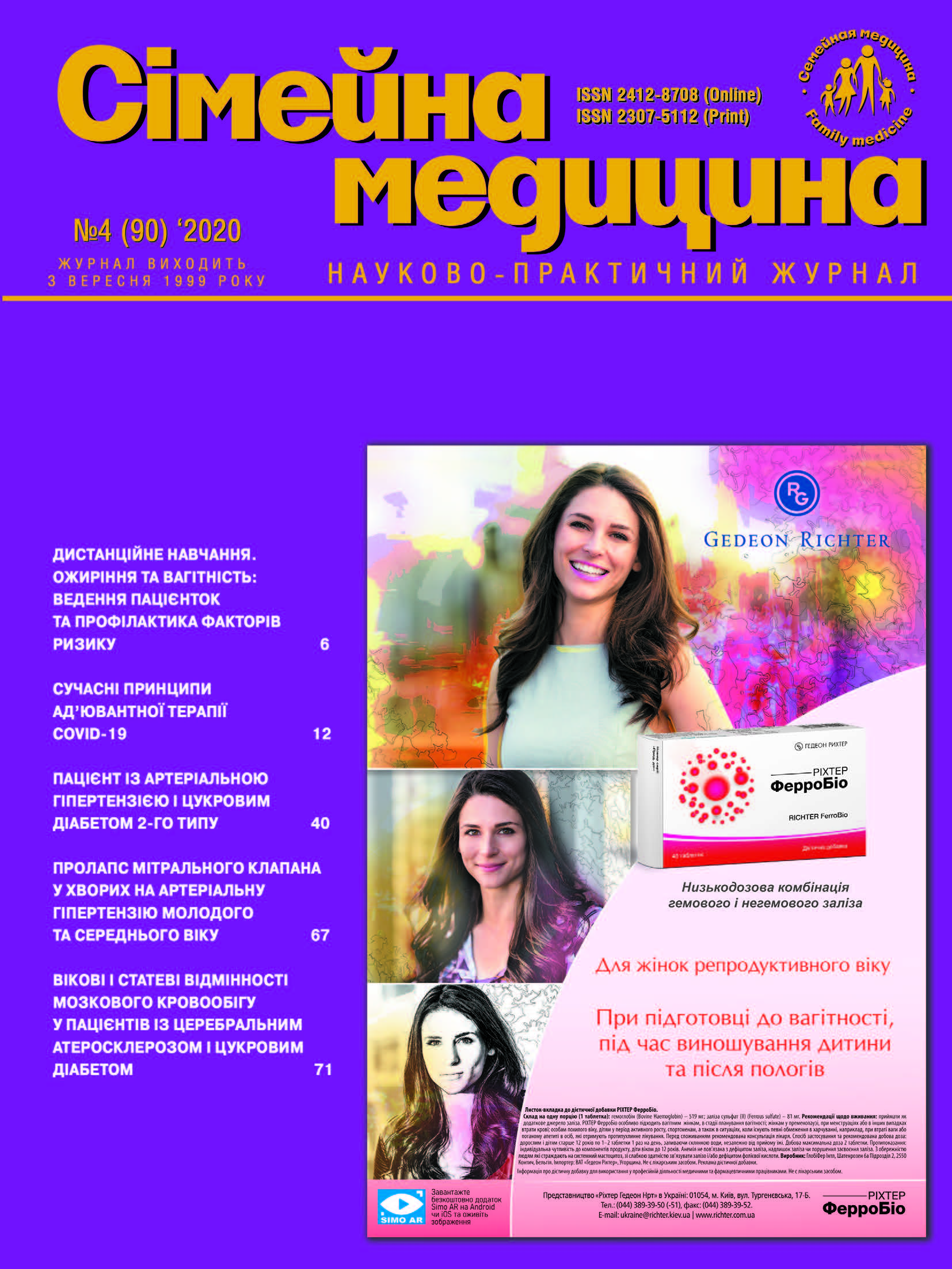Modern Principles of Adjuvant Therapy of COVID-19
##plugins.themes.bootstrap3.article.main##
Abstract
COVID-19 pandemic brings new challenges to healthcare systems all around the world. According to the literature, 80 % of patients have a mild or moderate disease, that doesn’t require inpatient care. Primary health-care providers play a great role in management such patients. There are no recommendations for the outpatient management for mild or moderate cases of COVID-19, including effective monitoring and prevention of severe cases . The article presents recent data of laboratory and clinical studies of prevention agents, outpatient treatment regimens approved by the EVMS Critical Care COVID-19 Management Protocol dated September 28, 2020.
Recommendations include dynamic monitoring of the patient at home (including pulseoximetry), using regimens such as melatonin, vitamin C, vitamin D, zinc, magnesium and others. Except general restorative effect, these regimens prevent the severe disease, and play a certain role in dampening the cytokine storm, facilitate early recovery.##plugins.themes.bootstrap3.article.details##

This work is licensed under a Creative Commons Attribution 4.0 International License.
Authors retain the copyright and grant the journal the first publication of original scientific articles under the Creative Commons Attribution 4.0 International License, which allows others to distribute work with acknowledgment of authorship and first publication in this journal.
References
Jehi L, Ji X, Milinovich A, Erzurum S, Rubin B, Gordon S. Individualizing risk prediction for positive COVID-19 testing. Results from 11,672 patients. Chest 2020.
Grant WB, Lahore H, McDonnell SL, Baggerly CA, French Cb, Aliaono JL. Evidence that Vitamin D supplementation could reduce risk of influenza and COVID-19 infections and deaths. Nutrients 2020; 12:988.
Shakoor H, Feehan J, Dhaheri AS, Ali HI, Platat C, Ismail LC. Immune-boosting role of vitamins D,C,E, zinc, selenium and omega-3 fatty acids: could they help against COVID-19. Maturitas 2020.
Calder PC. Nutrition, immunity and COVID-19. BMJ Nutrition, Prevenion & Health 2020; 3.
Pistollato F, Masias M, Agudo P, Giampieri F. Effects of phytochemicals on thyroid function and their possible role in thyroid disease. Ann N Y Acad Sci 2019;1433:3–9.
Tonstad S, Jaceldo-Siegl K, Messina M, Haddad E. The association between soya consumption and serum thyroid-stimulating hormone in the Adventist Health Study-2. Public Health Nutr 2016;19:1464–70.
Freedberg DE, Conigliaro J, Sobieszczyk ME, Markowitz DD. Famotidine use is associated with impoved clinical outcomes in hospitalized COVID-19 patients: A propensity score matched retrospective cohort study. medRxiv 2020.
Janowitz T, Baglenz E, Pattinson D, Wang TC, Conigliaro J. Famotidine use and quantitative symptom tracking for COVID-19 in non-hospitalized patients: a case series. Gut 2020; 69:1592–7.
Mather JF, Seip RL, McKay RG. Impact of famotidine use on clinical outcomes of hospitalized COVID-19 patients. Am J Gastroenterol 2020.
Malone RW, Tisdall P, Fremont-Smith P, Liu Y, Huang XP, White KM. COVID-19: Famotidine, Histamine, Mast Cells, and mechanisms. Research Square 2020.
Meng Z, Wang T, Chen L, Chen X, Li L. An experimental trial of recombinant human interferon alpha nasal drops to prevent COVID-19 in medical staff in an epidemic area. medRxiv 2020.
Bianconi V, Violi F, Fallarino F, Pignatelli P, Sahebkar A, Pirro M. Is acetylsalicylic acid a safe and potentially useful choice for adult patients with COVID-19. Drugs 2020.
Muller C, Karl N, Ziebuhr J, Pleschka S. D,L-lysine acetylsalicylate + glycine impairs coronavirus replication. J Antivir Antiretovir 2020.
Varatharajah N. COVID-19 CLOT: What is it? Why in the lungs? Extracellular histone, “auto-activation” of prothrombin, emperipolesis, megakaryocytes, “selfassociation” of Von Willebrand factor and beyond. Preprints 2020.
Lopez A, Duclos G, Pastene B, Bezulier K, Guihaumou R, Solas C. Effects of hydroxychloroquine on Covid-19 in Intensive Care Unit Patients: Preliminary Results. Int J Antimicrob Agents 2020.
Tett SE, Cutler DJ, Day RO, Brown KF. Bioavailability of hydroxychloroquine tablets in healthy volunteers. Br J Clin Pharmac 1989; 27:771–9.
МacGowanHamilton F, Bayliss M, Read L, Attwood M. Hydroxychloroquine serum concentrations in non-critical care patients infected with SARS-CoV-2. medRxiv 2020.
Nicol MR, Joshi A, Rizk ML, Sabato PE, Savic RM. Pharmacokinetic and pharmacological properties of chloroquine and hydroxychloroquine in the context of COVID-19 infection. medRxiv 2020.
Hoffmann M, Mosbauer K, Hoffman-Winkler H, Kaul A, Kleine-Weber H. Chloroquine does not inhibit infection of human lung cells with SARS-CoV-2. Nature 2020.
Effect of Dexamethasone in hospitalized patients with COVID-19-Preliminary report. N Engl J Med 2020.
Schultze A, Walker AJ, MacKenna B, Morten CE, Bhaskaran K, Brown JP. Inhaled corticosteroids use and the risk of COVID-19 related death among 966,461 patients with COPD or asthma: An OpenSAFELY analysis. medRxiv 2020.
Bassetti M, Kollef MH, Timsit JF. Bacterial and fungal superinfections in critically ill patients with COVID-19. Intensive Care Med 2020.





